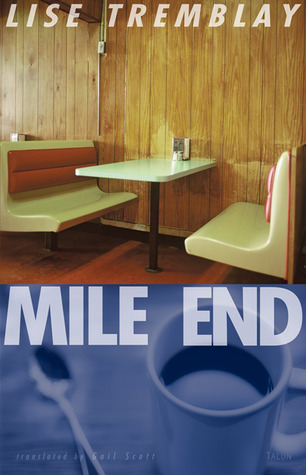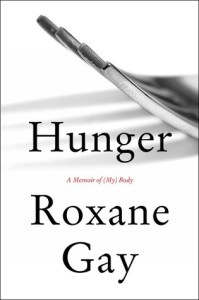I want to thank Naomi at Consumed by Ink for recommending this book to be part of my reading fat women goal!
Mile End is solidly a novella, coming in at 142 pages. It was published in 2002. The title refers to an area of Montreal called Mile End, which is known as “a hip, laid-back area with an artsy vibe and multicultural roots. Old-school bagel shops, Greek eateries and Italian cafes mix with stylish restaurants and buzzing brunch spots. Indie shops selling records, books and vintage clothes are found throughout the area. . .” You may not realize as much, though, because our narrator, an unnamed fat woman, who mainly frequents the same Chinese restaurant/cafe. She is not “hip,” nor is she apt to follow retro trends. Basically, the novella is about a fat woman who dispassionately plays piano, has an uncaring lover, and tries to position herself carefully within her family.

Lise Tremblay’s novella arguably falls into postmodernism, specifically minimalism. For those that don’t know, what that means is:
“The characters in minimalist stories and novels tend to be unexceptional. Generally, the short stories are ‘slice of life’ stories. . . . Minimalist authors hesitate to use adjectives, adverbs, or meaningless details. Instead of providing every minute detail, the author provides a general context and then allows the reader’s imagination to shape the story.”
That feeling of “lack” in the story is prominent in Tremblay’s writing. Often, her narrator makes proclamations without clarification. She points out, like all fat women, she hasn’t eaten since breakfast, drops food on her clothes, is a clown, likes winter, has sparse/limp hair, and sweats over nothing. Now, because I am specifically reading fat women to find positive representation, I’m conflicted by what Tremblay has written. While she does capture the experiences of many fat people, there isn’t much positive about the narrator. I haven’t decided how I feel about that. Sometimes the narrator is cruel to herself, at one point claiming she is a whale, but for the most part she is matter-of-fact about her body, which I personally found comforting. It’s not often I see someone like me on the page.

Additionally, the character notes how her body fills spaces, which is another way Tremblay shows a fat person on page without polarizing her (monster/hero). The narrator stretches her legs to give her body the space it demands, she can’t buckle the seat belt in a car, she doesn’t fit in regular bath tubs, she turns red and breathy when putting on her snow boots, etc. While many readers may see these examples and feel negatively, I also felt like Tremblay was capturing the experience of living in a fat body.
Fat is a family issue. It is passed through generations and can even be what visually holds a clan together. The narrator’s father is famous. Upon seeing him on the cover of a magazine, the narrator notes, “My father is gaining weight again, a lot; soon he’ll be back like his brothers, like me, nice and round and pink. The thought must frighten him to death.” When she hit puberty, the narrator started to grow round like her father’s family, and fat is a sign of “moral laxness” to him.
Notice the difference between calling herself a “whale” and “nice and round and pink.” Her self-abuse likely comes from society, but also her father’s opinions. Throughout, the narrator mentions how she doesn’t want to change. Her job is to play piano at a ballet studio where she notices the newest ballerinas often are taken away in ambulances after passing out because they haven’t been eating, which, she asserts, will certainly lead to losing a kidney. The narrator never envies the dancers their thinness, and when her lover, a fat man, tries to diet, she claims, “I’m not interested in being saved.” I loved this — her words imply thin people are saved in a religious sense, while fat people are evil. That’s not for her.
The father’s family — all fat — is represented by the “little white house” in which he grew up. There’s also what the narrator “carries” in her fat: her father as a boy, stories she cannot tell, the world’s inertia, passion, her father’s family, and her soul. The fat storage and house are a minimalist way that forces readers to fill in the gaps of what the narrator’s body means in relationship to her family, herself, place, and society. It’s not explained for readers, and some people may find that frustrating.
Lastly, there are some translation issues, which stand out because the sentences don’t entirely make sense. Here is an example that makes it look like Gail Scott used Google translate: “I beckon to the Chinese guy, and am served another long expression in a brown china cup, very heavy.” Sometimes a word is missing: “His sisters and mother are dressed their fancy holiday clothes.” The prepositions become a problem: “She’s been lulled asleep by the saccharine music of the shopping centers where she spends too much time in.” To be fair, the whole book doesn’t read this way, but when Scott gets her translations wrong, they’re obvious.
Overall, I would recommend this book. Although minimalist, it’s also realistic, complicated, and makes you think more about existing in fat bodies. A good companion book would be Roxane Gay’s memoir Hunger.


I do like it when books represent people (or situations, or….) in a realistic way. It makes the story feel more authentic. And this one does sound like an interesting look at a fat person’s life. I’m glad that it doesn’t paint fat people as either heroes or monsters. Most of us are neither, if I can put it that way.
LikeLike
I have so much to learn. I appreciate the explanation of minimalist stories. Thank you.
Hunger definitely sounds intriguing. I enjoy reading complicated books. I’m not sure how I feel about minimalist stories but perhaps this is a good opportunity to explore whether that’s a style that works for me or not. 🙂
LikeLike
I’ve found that they tend to be shorter (novella length) and are hit and miss for me. I read one a few years ago called Camera by Jean-Philippe Toussaint that was terribly boring. A man walks around a city doing mundane activities, and he’s totally obsessed with himself. An excellent post-modern novel I loved is In & Oz by Steve Tomasula. Here is a the Goodreads link: https://www.goodreads.com/book/show/967251.In_Oz?from_search=true
It’s a bit more experimental. Postmodernism covers a lot of different styles.
LikeLiked by 1 person
A vision of a self observed protagonist wondering around doing mundane things sounds extremely boring, I’ll stay away from that one, thanks.
Adding In & Oz to my TBR list! Thanks for both the link as well as the recommendation. I enjoy expanding my reading horizons and this should be fun.
LikeLike
You’re so welcome!
LikeLiked by 1 person
I’m glad that the main character seems to have a healthy enough sense of self-esteem to say she doesn’t want to be saved and to call herself nice and round and pink. I’m glad Naomi gave you a solid recommendation (of course she did, she’s Naomi!)
LikeLike
Naomi seemed uncertain about whether or not this book would count as “positive” representation, and I can see why she hesitated. I hesitate too, but the fact that the character CAN waver and feel very negatively about herself seems realistic to me. It’s a complicated little book.
LikeLiked by 1 person
What a pity about the translation – that would quite probably drive me nuts! I must say this sounds like a very realistic portrayal of a fat character, based on what you’ve said. For me, that would be more interesting than either a negative or positive portrayal, both of which could easily feel contrived to make a “point” – I’m not big on points! Not sure how I’d go with the minimalist thing though…
LikeLike
I don’t see you enjoying minimalism, but I know you dislike diatribes in stories; there’s none of that here. I don’t think I’ve read many books yet in which the fat experience is 100% positive, and I’m glad, but the completely negative experience is somehow acceptable because it reinforces that the culture wants to see. I just want reality.
LikeLiked by 1 person
I’m so relieved you liked it! And also interested to hear you also feel conflicted about whether the book gives a positive or negative message. It does kind of give both, which is probably why it feels realistic. Most of us feel differently about our bodies on any given day.
Did the ending surprise you??
LikeLike
I felt like the ending was not earned, but I didn’t write about it because 1) that would spoil things, and 2) I would want to reread the novella to see if the plot built up to it in subtle way I didn’t catch. Perhaps it wasn’t real, but a metaphor.
LikeLiked by 1 person
Interesting! The translation issues may bother me with this read. With those types of errors, they pull me out of what I’m reading and then instead of focusing on the story and characters, I focus on those little details. And I’m taking your advice and commenting on a current post! I still want to go back and read all of your old posts – I’ve got them all saved up 🙂
LikeLike
That’s so nice of you, Ami! Thank you 😊 In the past, I’ve never known if I should comment on translations–I’m not a translator–but these were obvious errors. On the other hand, I don’t know how accurately translated the individual words or tone of the novella is.
LikeLike
Ever since you started this journey, I’ve been on the lookout for fat protagonists. Alas. My reading has yet to really provide me with books to recommend. I’m so glad that Naomi was able to recommend one! It sounds like a good recommendation overall, too. I find that books which leave me pondering them long after to be the best ones in the end.
Confession: I don’t know what word is missing in your second translation example. That said, I know the pain of poor translations. When I was young, I tried to read a poorly translated copy of The Three Musketeers. Let’s just say that even at 12 I knew something was drastically wrong. Poor translation can be devastating to a published work. I wonder if Tremblay consistently uses Scott as a translator? Also, is the original language French?
This work sounds compelling. I haven’t read anything I’d consciously label as minimalist. But I do love filling in the blanks of stories myself. What do you think is a good introduction to minimalism?
LikeLike
The second translation example is missing the word “in.” Your brain is filling in the blanks for you ☺️ I’m not sure what would be a good introduction because I’m not a big fan of minimalism. People in Montreal speak French (it’s a city in Quebec, Canada). Fun fact: it’s promised “kay-beck-kwa” in French.
LikeLiked by 1 person
!! You’re right! It did. How fascinating. I’m impressed you were able to catch that, then. Well done indeed.
Oy. French is such a beautiful and confusing language. No idea why Quebec would be pronounced kay-beck-kwa by looking at it, but c’est la vie. 😉
LikeLiked by 1 person
This does sound like an interesting read and a three-dimensional exploration of how it is to inhabit a fat body, which is, I suppose, going to have good and bad just like inhabiting, for example, a runner’s body is (I can do this in yoga but I can’t do a forward fold; I eat well but my god you’re going to find me sleeping a lot in training periods, etc.) (not contrasting a runner’s body with a fat body there; I’m a solid runner not a whippet, but a runner’s body is what I personally define myself as inhabiting). I’m glad you’ve found a nuanced read that’s not about saving oneself through dieting.
LikeLike
I get what you’re saying, Liz! All bodies have problems and highlights. Personally, if someone spends ages on their make up to get their face “right,” I’d call that a problem.
LikeLike
I hadn’t read about minimalist fiction before, it’s an interesting idea. I can sympathise with the author being a ‘whale’ some days and round and pink on others. We all have our down days and our up days.
LikeLike
Are there not a lot of minimalist writers in Australia? In the US in the last several years, the minimalist movement tends to come from been in their 20s writing about walking around cities like Chicago and facing boredom, unemployment, etc. I kind of wonder the point, myself.
LikeLike
I really appreciate you defining minimalism writing to me, because i had never heard of that before but now that I think about it, I’ve read lots of books that are in that style. Would you be alright with me using that as a topic for one of my radio columns this year?
LikeLike
Go for it! It’s not as well known as a writinv style, but it sticks out like a sore thumb when you see it. Plus, Mile End is a Canadian book, if you want to mention it.
LikeLiked by 1 person
ok awesome! Perhaps I might start gathering ideas for a September or October segment-and of course i will mention you!
LikeLike
Thanks!
LikeLiked by 1 person
[…] b) after a few days the word count was out of control; and c) I could call it minimalism (see GTL here) but that still wouldn’t make it either interesting or good […]
LikeLike